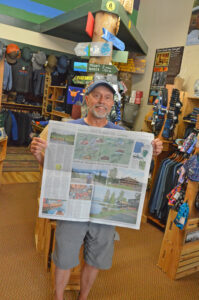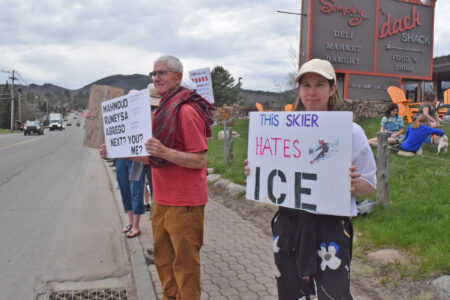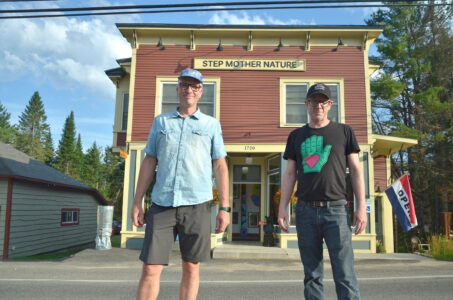Did Kate Smith make up for racist songs?
Civil rights activists, others discuss her 1945 radio plea to end bigotry

Kate Smith (Photo provided by the Lake Placid-North Elba Historical Society)
LAKE PLACID — A transcript from a radio show aired at the tail end of World War II was recently unearthed, shedding new light on a local icon under fire for singing a pair of songs with racist lyrics.
On the 1945 show, famed radio personality, singer and part-time Lake Placid resident Kate Smith issued a plea for tolerance. She said social prejudices, religious bigotry and “race hatreds” were “diseases that eat away the fibers of peace.”
“Unless they are exterminated,” she said, “it’s inevitable that we will have another war.”
This piece of Smith’s legacy comes into the spotlight amid backlash over her singing “Pickaninny Heaven” and “That’s Why Darkies Were Born” in the early 1930s at the beginning of her career. The former is full of offensive stereotypes of black children, and the latter contains lyrics such as, “Someone had to pick the cotton, Someone had to pick the corn, Someone had to slave and be able to sing. That’s why darkies were born.”
In response to a complaint about Smith’s past songs, the New York Yankees stopped playing her rendition of “God Bless America” during the seventh inning. The Philadelphia Flyers followed suit and also removed a statue of her outside their arena.
Smith’s speech advocating for tolerance appeared roughly 12 years after those songs, in January 1945, on the CBS radio show “We, the People.”
She led the program — aired in the same month that Russian soldiers overtook Auschwitz, one of the largest concentration camps — with a story about a Christian family in Belgium that helped hide three Jewish people from the Nazis, according to a recent article in the Philadelphia Inquirer.
“And where are they going to be exterminated?” she said of prejudice, bigotry and race hatred. “At a conference table in Geneva? Not by a long shot. In your own city — your church — your children’s school — perhaps in your own home.”
The message was shared widely. According to a 1945 issue of Tune In, a monthly radio magazine, sponsors of “We, the People” received more than 20,000 requests for transcripts of her speech after it aired.
–
“Not trying to erase history”
–
Martha Swan, director of the non-profit civil rights organization John Brown Lives, said the speech suggested that Smith was truly changed by “the reality of her times, her encounters and experiences.”
Swan said that she felt Smith’s message remained as timely and urgent now as it was then.
“I think we all have something to learn from Kate Smith here, and we’re in conversation with others about convening an open community conversation,” she said.
Martha Pritchard Spear, a Lake Placid resident and former president of the Lake Placid Rotary Club, stood behind Smith after the Yankees and the Flyers dropped her.
She said reading the transcript “makes me see her as a more well-rounded person,” she said.
“She was a complicated and passionate person.”
Following an “intense discussion” on April 25 about whether to remove Smith’s name from an annual high school music scholarship given out by the Lake Placid Rotary Club, the group decided to keep her name on the award.
It’s that sort of broad discussion that Spear, a Rotarian, said she thinks the community as a whole needs to participate in.
“We’re not trying to erase history. We’re trying to understand ourselves in relation to it,” she said.
–
“They still hurt”
–
Alice Green, a black woman raised in Essex who now serves as the executive director of the Center for Law and Justice in Albany, said she believes Smith’s early song renditions perpetuated stereotypes that are harmful to people of color.
“Hopefully she realized what she’d done in terms of the effect of her songs,” she said. “I think it’s good. People can learn from things that they’re doing.”
Green said many people don’t realize the different shapes racism can take. The stereotypes perpetuated in those two songs remain, she said, and the lyrics Smith sang have outlasted her.
“They live on and they affect how white people view us and see us,” she said. “The stereotypes remain. We’re starting to think about history more, and the legacy of not only slavery but Jim Crow, and how those stereotypes stay with us.”
Green said she feels people are becoming more sensitive to racism, and more aware of how words, lyrics and songs can promote stereotypes.
“(Those stereotypes) still hurt. That’s important to understand,” she said.
Green said that she hoped Smith’s 1945 speech signified her growing awareness.
“I think her message resonates. Maybe she learned a lot about those songs that she did in the 1930s, and how they might have resonated,” she said. “We went through a war. It was a fight for freedom, and African Americans didn’t benefit from that war when they came back. They still faced segregation. I’m hoping that she learned something in that period.”
—
Kate Smith on “The Value of Tolerance”
“It seems to me that faith in the decency of human beings is what we must have more of, if there is to be a future for all of us in this world. We read in the papers every day about conferences on the best way to keep the peace. Well, I’m not an expert on foreign affairs — and I don’t pretend to know all the complex things that will have to be done for a lasting peace. But I am a human being — and I do know something about people. I know that our statesmen — our armies of occupation — our military strategists — may all fail if the peoples of the world don’t learn to understand and tolerate each other.
“Race hatreds — social prejudices — religious bigotry — they are the diseases that eat away the fibers of peace. Unless they are exterminated it’s inevitable that we will have another war. And where are they going to be exterminated? At a conference table in Geneva? Not by a long shot. In your own city — your church — your children’s school — perhaps in your own home.
“You and I must do it – every father and mother in the world, every teacher, everyone who can rightfully call himself a human being. Yes, it seems to me that the one thing the peoples of the world have got to learn if we are ever to have a lasting peace, is — tolerance. Of what use will it be if the lights go on again all over the world — if they don’t go on … in our hearts.”
— From a May 1945 issue of Tune In, a radio magazine, excerpted from a January 1945 speech she gave on CBS’s “We, the People” radio show




